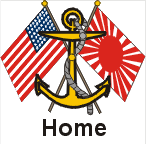 |
|||||||||||||||||
|
|
|||||||||||||||||
|
Buy your copy at these fine stores! |
|||||||||||||||||
 |
|||||||||||||||||

|
|||||||||||||||||
 |
|||
|
|
|||
|
Prologue: The First Blow The klaxon horn blared, piercing the comfortable silence of a calm Sunday morning, and shook Commander Clifton Albert Frederick Sprague awake. Scrambling into his clothes, he ran out the door of his quarters and sprinted as fast he could to the bridge, where he screamed into the speakers, "Quarters! Quarters! Dammit! Hurry!" Explosions like rolling thunder filled the Hawaiian morning air. The first bombs fell from attacking Japanese planes on December 7, 1941 at 7:50 a.m. Sprague's ship, the seaplane tender Tangier, was anchored next to the dock at Ford Island. The old battle- and target ship Utah and the cruisers Raleigh and Detroit were tethered forward of the Tangier. Battleship Row, which included the battleships Arizona, Maryland, California,Pennsylvania, Tennessee, Oklahoma, West Virginia, and Nevada, the oiler Neosho, and the ammunition ship Vestal, was on the other side of Ford Island. Vibrations from the bombs exploding all around Ford Island rumbled through the Tangier. A seaman rushed from the mess hall, yelling, "They're bombing us! They're bombing us!" All around Pearl Harbor, Schofield Barracks, Hickam Field, Wheeler Field, Bellows Field, flame and smoke shot up as the missiles found their targets. By 8:00 a.m., the official alarm came from the Ford Island control tower commander, "AIR RAID PEARL HARBOR, THIS IS NO DRILL!" This message echoed around the world and changed the course of history. But the pandemonium reigning outside the Tangier did not touch the organized, purposeful spirit prevailing within it - a byproduct of the many drills Sprague had ordered since taking command in July 1940. The Tangier's gunners opened fire almost immediately on the attacking airplanes. Shell casings clanked loudly as they fell to the metal deck from the breeches of the ship's 3-inch guns. Every man aboard the seaplane tender knew his job and went to it the moment the horn sounded. Such exactitude was normal on any ship Clifton Sprague commanded. His know-how and quiet, self-assured manner inspired confidence and discipline in his crew, winning the kind of respect that ensured whole-hearted cooperation. |
|
|
|